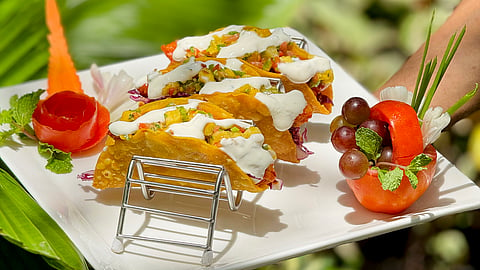Feast on Mangoes, before it's too late at this food festival in Chennai
There’s nothing like biting into a ripe, juicy mango, eating away its golden-yellow flesh, and scraping off every last bit of the fruit from the seed with our teeth, until only a pale white seed remains. For Chennaiites, this is religious, as every summer brings a vibrant parade of mangoes into the city’s fruit stalls — from the sweet Imam Pasand, to the tangy Banganapalli, and the fragrant Alphonso. Every variety has its moment of glory, piled high on vendor carts, drawing customers like bees. But as June prepares to draw to an end and the south-west monsoon treats us with occasional rainfall, the once-abundant displays begin to shrink. The prices of mangoes creep up, and our favourite varieties start disappearing one after another, reminding us that the season is slipping away.
But what if we told you that you don’t have to part with mangoes in sorrow this season? What if, instead, you could celebrate the fruit in all its glory — served fresh and cold in cocktails, stirred into savouries, and folded into desserts?
Chef, food historian, and MasterChef India (Tamil) judge Rakesh Raghunathan along with Wild Garden Café, Amethyst, Chennai, are presenting Amra — a mango festival — between June 20 and 30; ready to give the fruit the send-off it deserves.
“We wanted to create recipes and dishes with mangoes that people won’t get in restaurants,” Chef Rakesh says, adding that the 15 new additions to the Wild Garden Café menu took him three weeks to curate. “In the south, we don’t make a lot of food with ripened mangoes, barring a few recipes like the mambazha pulissery. So, I wanted to feature the fruit and showcase its versatile flavours as much as possible with this curation,” he declares.
Classics reimagined
One of the dishes on this menu is a curated platter, crafted for those who’d wish to pair their mangoes with cocktails and mocktails. Called ‘Mango Mayhem’, the platter is a sweet-and-savoury balance made to complement every sip. “There is a salsa with ripe mangoes, a salsa with raw mangoes, and drawing inspiration from the Marina beach, we have done a thenga-manga pattani hummus. These dips are paired with ragi thattais (millet crisps) and rice vadagam (crisps),” Rakesh says.
For one of the main course dishes, the food historian chose 'Avakkai Biryani,' a dish inspired from neighbouring Andhra Pradesh. The biryani — a fragrant, regional flavour that is layered with spices — is not just cooked with the oil and pickled avakkai, he says. “The dish is made or treated like a biryani, with oil, ghee, onions, tomatoes, and whole spices, cooked really well, before adding the avakkai pickle’s gravy and oil. It has a subtle flavour of mustard and the chilli powder,” he adds. The pickle however, was prepared with the last season’s raw mangoes, allowing the fruit to soak in the gravy and oil for a richer flavour, he notes.
For non-vegetarians, there’s Mango Chilli Chicken — a dish where sweet mango takes centre stage. Inspired by the classic honey-glazed chilli chicken, this version offers a gentle kick from the chilli, while still letting the natural sweetness of the mango shine through, explains Rakesh.
And what’s a mango feast without dessert — the course it feels most at home? Among the three recipes on the menu sits the Mango Bhappa Doi. Inspired from the Bengali Mishti Doi, the traditionally steamed yogurt dessert paves way for sweet ripe mangoes, served cold in a small earthen pot, garnished with finely chopped, fresh mangoes.
When asked whether the constant innovation that goes behind such carefully curated courses puts him under pressure to keep creating something new, Rakesh says no. “I love to experiment — it’s the creative process I enjoy the most,” he concludes.

